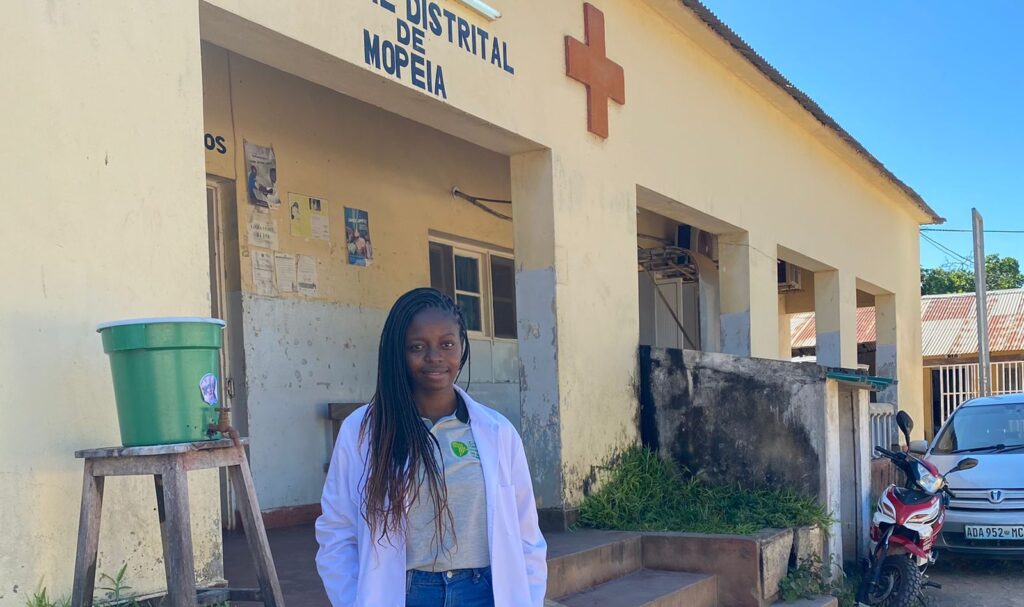
Amélia Albino Honwana is part of BOHEMIA’s medical team. She is currently based in Mopeia, supporting operational activities and also monitoring and reporting on severe adverse effects and pregnancy data.
As a child, what did you want to be when you grew up? Were you already attracted to the field of health?
When I was a child, I always wanted to become a doctor. Having grown up in a community that was deeply affected by infectious diseases, I always wanted to find solutions to health problems. So, I worked hard to gain a full scholarship to study ‘General Medicine’ at Voronezh State Medical University in Russia.
Following my studies, I never imagined that I could work as a doctor in a research environment, especially in Mozambique where opportunities for a career in medical research are limited. However, my work in Mozambique has taught me that medicine is not limited to treating patients, it can also contribute to improving people’s health through research on innovative solutions to public health challenges.
When you heard of the BOHEMIA project, what did you first think about using ivermectin for malaria control?
“In my childhood, I suffered from malaria every year, without exception. Now as a doctor, I treat malaria patients daily in Mopeia.”
Despite the availability of new and affordable tools like insecticide-treated bed nets and indoor residual spraying, malaria continues to affect millions of people in many parts of the world.
When I heard about the possibility of using ivermectin as a malaria prevention intervention, I was very fascinated by the idea. Ivermectin is a well-known and well-tolerated drug used to treat other diseases, but its use as a tool to combat malaria is novel.
Additionally, I feel proud and grateful to work alongside this talented and diverse team of global health advocates. It is a joy to wake up every day and know that I contribute with my little experience, passion, and commitment to this important project.
What is your role in the BOHEMIA trial and what do your day-to-day tasks look like?
I am one of the study physicians in the BOHEMIA trial in Mopeia. I am also the youngest and the only woman in a team of three. This gives me the opportunity to learn from my experienced colleagues every day at work. In my day-to-day, I divide my time between the office, the local hospital (Hospital Distrital de Mopeia), and the field.
In the office, I monitor and report on severe adverse events and pregnancy data of the BOHEMIA trial. Some days, I also support the preparation of operational activities of this mass drug administration trial (MDA). At the hospital, I support the local hospital staff with clinical work like helping out in the emergency room. Lastly, in the field, I supervise the activities of the MDA field workers of five study clusters, along with overseeing the passive malaria case detection data collection process.
Some of my key responsibilities in the BOHEMIA trial so far have included: contributing to the design and implementation of our safety surveillance strategy, preparing SOPs (standard operating procedures), training field workers to do household visits for the MDA, as well as training them in data collection related to Neglected Tropical Diseases (NTDs).
Tell us about your work with pregnancy data and why it is important for the project.
One of my roles as a study physician in the BOHEMIA trial is to report all pregnancies that occur among study participants. Considering the lack of substantial evidence on the safety of ivermectin for pregnant women and the fetus, we systematically exclude pregnant women from the trial. However, in certain instances, a participant might test positive for pregnancy during the course of this three-month-long MDA and that is where the medical team comes in.
We intend to follow up on such pregnancies until the child is born.
“Collecting pregnancy data in a massive trial like BOHEMIA is challenging but important.”
Monitoring such data might help not just BOHEMIA, but also other similar trials involving ivermectin.
What do you think is needed to advance the fight against malaria, and how does BOHEMIA fit in?
Though we have made immense progress in malaria control over the last two decades, for a country like Mozambique, there is still a long way to go. Mozambique was one of the six countries that accounted for 55% of global malaria cases in 2021. A majority of these cases include children under five and pregnant women.
The BOHEMIA trial’s ambitious aim to include an additional prevention intervention in the malaria toolbox can be a game-changer in fighting transmission at the community level. If implemented, I believe that within a few years, this new proposed intervention will be able to exponentially reduce the number of malaria deaths, especially in low-income countries. Then I will be able to say that I was part of such an impactful project.
About the BOHEMIA consortium
BOHEMIA is a consortium led by ISGlobal and supported by Unitaid. It includes three African institutions—the Manhiça Health Research Centre (CISM) in Mozambique, the Kenya Medical Research Institute (KEMRI), and the Ifakara Health Institute (IFI) in Tanzania—as well as three academic partners: the University Hospital of Bern, the University of Oxford , and Virginia Tech.






